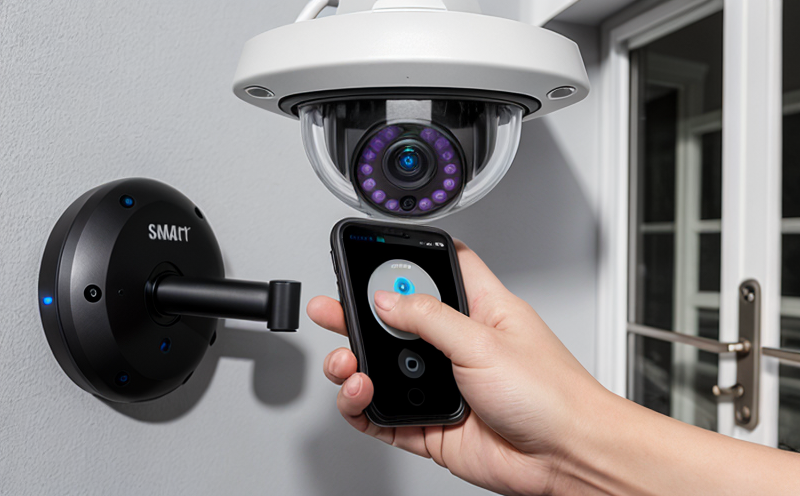ISO 27001 Information Security Management in Smart Surveillance Systems
The implementation of ISO 27001 within smart surveillance systems is crucial for protecting sensitive data and ensuring compliance with international standards. This certification provides a framework that helps organizations manage risks to information assets through effective information security controls.
Smart surveillance systems are increasingly integrated into our daily lives, providing enhanced security and convenience. However, they also present unique challenges in terms of information security due to the vast amount of data generated by these devices. Ensuring that these systems comply with ISO 27001 not only protects user privacy but also enhances trust between businesses and consumers.
ISO 27001 focuses on establishing, implementing, maintaining, and continually improving an information security management system (ISMS). This includes defining the scope of the ISMS, identifying assets to protect, assessing risks, selecting appropriate controls, and ensuring their implementation. The standard also emphasizes the importance of regular reviews and updates to adapt to changing threats.
In the context of smart surveillance systems, implementing ISO 27001 involves several key steps:
- Asset Identification: Identifying all assets that are part of the system, including hardware, software, data, and personnel involved in its operation.
- Risk Assessment: Conducting a thorough risk assessment to identify potential threats and vulnerabilities. This process involves analyzing the likelihood and impact of these risks on the system's security posture.
- Control Selection: Selecting appropriate control measures based on the identified risks. These controls could range from technical solutions like encryption to organizational policies such as user access management.
- Implementation and Maintenance: Ensuring that all selected controls are implemented effectively and continuously monitored for effectiveness. This includes regular audits and updates to align with evolving threats.
The certification process itself involves a series of assessments conducted by external auditors who verify compliance with the ISO 27001 standard. Once successfully certified, organizations can demonstrate their commitment to information security best practices and enhance their reputation among customers and partners.
For businesses operating in sectors that handle sensitive data or operate critical infrastructure, such as healthcare providers and government agencies, this certification is particularly valuable. It not only ensures compliance with legal requirements but also offers a competitive edge by demonstrating a robust approach to information security.
Eurolab Advantages
EuroLab offers unparalleled expertise in the field of smart surveillance systems testing and certification. Our team of certified professionals brings extensive experience in implementing ISO 27001 across various industries, ensuring that your organization achieves the highest standards of information security.
Comprehensive Services: EuroLab provides a full range of services from initial audits to ongoing support for maintaining compliance with ISO 27001. Our comprehensive approach ensures that all aspects of your smart surveillance system are covered, leaving no stone unturned in terms of risk management and control implementation.
Customized Solutions: Every organization is unique, and we recognize the need for customized solutions to meet specific requirements. EuroLab works closely with clients to tailor our services to fit their individual needs, ensuring that the certification process is both efficient and effective.
Expertise and Experience: Our team comprises industry experts who stay updated on the latest developments in information security standards and best practices. This ensures that your organization receives the most current and relevant guidance during the certification process.
Proven Track Record: With a long history of successfully certifying organizations with ISO 27001, EuroLab has built a reputation for excellence in this field. Our clients can rest assured knowing they are working with professionals who have demonstrated their capability to deliver high-quality results.
Why Choose This Test
- Enhanced Security: Ensures that your smart surveillance system is protected against unauthorized access and data breaches, safeguarding sensitive information.
- Compliance with Regulations: Helps organizations meet legal requirements and industry standards related to information security.
- Improved Reputation: Demonstrates a commitment to maintaining high standards of security, which can enhance trust and credibility among stakeholders.
- Risk Management: Identifies potential risks early on and provides strategies for mitigating them effectively.
- Cost Savings: By preventing costly data breaches and legal penalties, this certification can lead to significant financial savings over time.
- Operational Efficiency: Streamlines processes and improves overall efficiency within the organization.
- Global Recognition: ISO 27001 certification is recognized worldwide, making it easier for your business to operate internationally.
- Customer Trust: Establishes a strong relationship with customers by demonstrating a commitment to protecting their data and privacy.
Environmental and Sustainability Contributions
The implementation of ISO 27001 within smart surveillance systems can contribute positively to environmental sustainability. By ensuring that sensitive information is securely managed, organizations reduce the risk of costly data breaches which might lead to unnecessary duplication of services or processes. This, in turn, helps minimize waste and resource consumption associated with rework.
Furthermore, ISO 27001 emphasizes the importance of regular audits and updates, which can help identify areas for improvement in terms of energy efficiency and operational effectiveness. For example, by optimizing access controls, organizations can reduce the need for redundant systems or over-provisioned resources, leading to lower power consumption and reduced carbon footprint.
The certification process itself also encourages continuous improvement, which is essential for maintaining sustainable practices over time. Organizations that successfully implement ISO 27001 are more likely to adopt other green initiatives as part of their overall sustainability strategy, contributing to a healthier planet for future generations.





